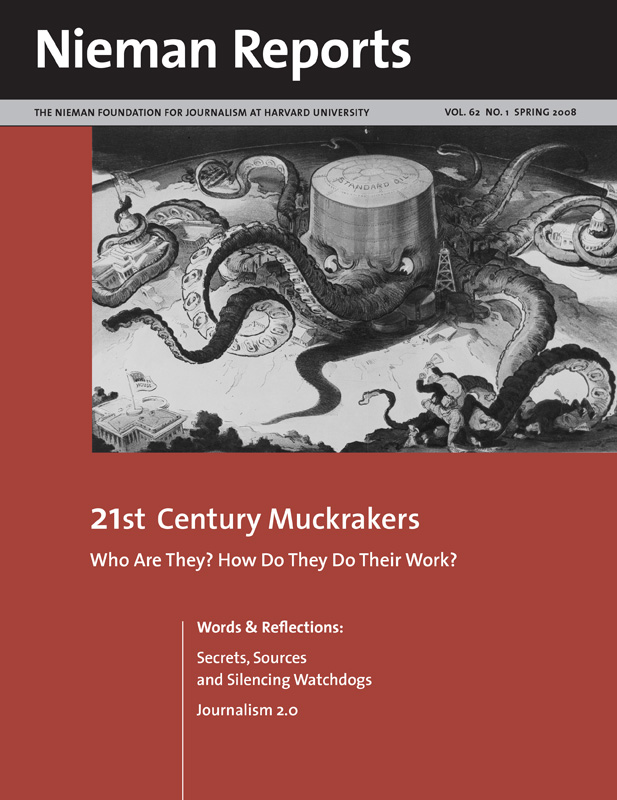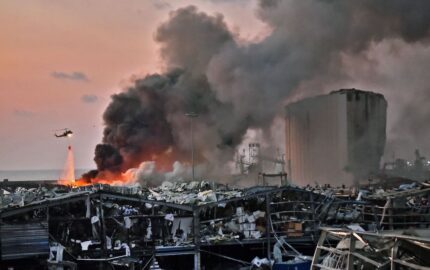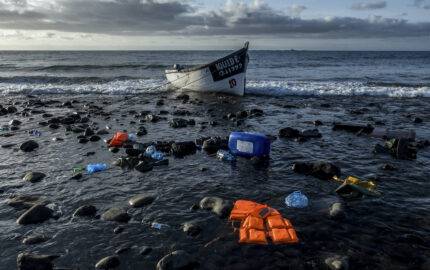
21st Century Muckrakers
Watchdog reporting resides at the core of what journalism does. Its roots dig deeply into the common ground uniting the muckrakers’ unearthing of public and private scandals a century ago with what investigative reporters are illuminating today. Though reporting and distribution of this news is very different in the digital era, unfortunately the human conditions requiring press scrutiny are not. These include patterns of corruption and malfeasance among those holding powerful positions of public and private trust.
Nearly seven years after September 11th, it is not hard to find reporting about our nation’s response to that tragic day. The wars in Afghanistan and Iraq, WMD and Abu Ghraib, Fallujah and insurgents, warrantless wiretapping and inadequate medical care for veterans seem like familiar stories. An incalculable number of newspaper articles and dozens of books—we count more than 50 on our bookshelves—and thousands of hours of television and radio coverage have been done on them. On the PBS series “Frontline,” where we work as producers, more than 40 documentary programs about such subjects have been aired since 9/11. Why then did we decide to add to this mix a four-and-a-half hour program detailing what some call “the war on terror” but what we entitled, “Bush’s War”?
In the spring of 2003, while the looting in Iraq was growing out of control, Secretary of Defense Donald Rumsfeld famously remarked, “Stuff happens!” His words were said to indicate callous indifference to the situation in Iraq, but Rumsfeld was also signaling that it would be a mistake to assign responsibility for it. Looting was simply something that happened. For quite some time, the press acquiesced.
This moment was indicative of how the news media have seemed unwilling to challenge the “stuff happens” assertions of those who hold positions of power. Events are reported, then new ones transpire, and they push the older ones out of the headlines, rarely to resurface. Journalists often lack the time and resources to provide much-needed context or to probe deeply into motivations and actions of the people involved so as to shed light on those who bear responsibility for events about which they are reporting. On television, in particular, such reporting is all too rare.
During the years since 9/11, we’ve produced 10 films for “Frontline” that chronicle the epic struggles over policy inside the Bush administration. These films have examined in depth how these battles resulted in the emergence of policies that have come to define this war. Our films straddle the fence between journalism and history—as Emmy Awards in both journalism and history attest. No matter the label, their focus remains on revealing how key decisions were made by those who were in the position to do so.
Portraying the Powerful
Last October “Frontline” Executive Producer David Fanning asked us to take on the project of producing a single film about the war by meshing new interviews and reporting with the series’ massive archive of hundreds of interviews and thousands of hours of footage. While we’d told parts of the story before, neither “Frontline” nor any other news organization had attempted to portray the Shakespearean dimensions of the full story of how decisions by the most powerful people in our government led us to the situation our country confronts today.
We knew from our prior reporting that decisions about interrogation techniques, war plans, the power of the presidency, domestic spying, and military strategy were not discrete stories but part of a single, fascinating narrative waiting to be told about the interplay among the most senior administration officials. We knew that our greatest challenge would be finding a way to translate the massive amount of material we’d accumulated into an accessible and comprehensible story.
So we drew boxes, stacking them to indicate how one event followed another chronologically. We whittled down our starting list of hundreds of key events to fewer than 100 of what we saw as more important moments. Into the boxes that remained, we plugged in the behind-the-scene stories we’d discovered about the key players involved. Our focus remained on President George W. Bush, Vice President Richard Cheney, Secretary of Defense Donald Rumsfeld, Secretary of State Colin Powell, Director of Central Intelligence George Tenet, and National Security Advisor and later Secretary of State Condoleezza Rice. We wanted to examine how bureaucratic battles among them led to some of the critical events and/or decisions in the Iraq War.
To tell the story of the failure of diplomacy in the run-up to the war, for example, we focused on the long-standing, multifaceted and always fascinating relationship between Secretary of State Powell and Vice President Cheney. Their strained relationship reached back to the Gulf War when Powell served as Chairman of the Joint Chiefs of Staff under then Secretary of Defense Cheney. From the moment Bush announced Powell’s appointment, Cheney had worked to marginalize Powell’s influence, primarily by bringing on Rumsfeld, a personal friend of Cheney’s, as Secretary of Defense. Rumsfeld and Cheney worked together to counter Powell’s attempts to moderate administration policy. As many Americans know already from reporting done primarily after Powell left the administration, he was effectively cut out of key decisions, ambushed in speeches, and attacked by anonymous administration officials in the press.
A focus on key people—on their temperaments, personalities and interactions of powerful people such as Powell, Cheney and Rumsfeld—is simply good storytelling. Often viewers get drawn into caring about policies and events they might otherwise not engage with through gripping, insightful portrayals of characters such as these. But such a focus is about more than producing a good television show; it is about fulfilling the presumed role of a free press in a democracy by explaining how and why our elected leaders and their appointees acted as they did.
This has been a daunting story to tell. Rarely could we find footage of times when these many decisions were being made behind closed doors. Often the principals were reluctant to talk. With interviews with key deputies—Deputy Secretary of State Richard Armitage, Army Secretary Thomas White, Powell’s Chief of Staff Larry Wilkerson, Deputy Attorney General Jack Goldsmith, NSC staffers Philip Zelikow and Franklin Miller and others—and with journalists who originally reported much of this story—Dana Priest, Steve Coll, Bob Woodward, Thomas Ricks, Karen DeYoung, Ron Suskind, Barton Gellman, Elisabeth Bumiller, Michael Gordon and others—it has been possible to piece together the dramatic events that happened out of sight (and sound) of the public.
Once our narrative course became clear, we dug inside our archive of 4,000 hours of videotape, hundreds of photographs, and numerous documents so we could make visual the stories we’d decided to tell. This time-consuming final stage is what rewards us—and our viewers—with the fascinating intersection and sometimes jolting juxtaposition of voice, document, film and photography.
In reporting and producing “Bush’s War,” we feel privileged—and at the same time obligated—to be able to shine our light in the dark corners of what is probably the most important story of our time. In future years, historians will have their turn; undoubtedly they will rewrite the story based on new information that will surely be uncovered. For now, however, it remains the job of journalists to do more than report the “stuff” that happens or bring to the public the “first rough draft of history.” At its best, journalism provides citizens with enough information to make an informed judgment about who is responsible for decisions made about policies conducted in their name.
Michael Kirk, a 1980 Nieman Fellow, is a founding producer of “Frontline,” now in it’s 25th season. He is the producer/director/writer and Michael Wiser is field producer of “Bush’s War,” which was first broadcast on PBS on March 24-25, 2008. Wiser is a 2003 graduate of Harvard Law School.
In the spring of 2003, while the looting in Iraq was growing out of control, Secretary of Defense Donald Rumsfeld famously remarked, “Stuff happens!” His words were said to indicate callous indifference to the situation in Iraq, but Rumsfeld was also signaling that it would be a mistake to assign responsibility for it. Looting was simply something that happened. For quite some time, the press acquiesced.
This moment was indicative of how the news media have seemed unwilling to challenge the “stuff happens” assertions of those who hold positions of power. Events are reported, then new ones transpire, and they push the older ones out of the headlines, rarely to resurface. Journalists often lack the time and resources to provide much-needed context or to probe deeply into motivations and actions of the people involved so as to shed light on those who bear responsibility for events about which they are reporting. On television, in particular, such reporting is all too rare.
During the years since 9/11, we’ve produced 10 films for “Frontline” that chronicle the epic struggles over policy inside the Bush administration. These films have examined in depth how these battles resulted in the emergence of policies that have come to define this war. Our films straddle the fence between journalism and history—as Emmy Awards in both journalism and history attest. No matter the label, their focus remains on revealing how key decisions were made by those who were in the position to do so.
Portraying the Powerful
Last October “Frontline” Executive Producer David Fanning asked us to take on the project of producing a single film about the war by meshing new interviews and reporting with the series’ massive archive of hundreds of interviews and thousands of hours of footage. While we’d told parts of the story before, neither “Frontline” nor any other news organization had attempted to portray the Shakespearean dimensions of the full story of how decisions by the most powerful people in our government led us to the situation our country confronts today.
We knew from our prior reporting that decisions about interrogation techniques, war plans, the power of the presidency, domestic spying, and military strategy were not discrete stories but part of a single, fascinating narrative waiting to be told about the interplay among the most senior administration officials. We knew that our greatest challenge would be finding a way to translate the massive amount of material we’d accumulated into an accessible and comprehensible story.
So we drew boxes, stacking them to indicate how one event followed another chronologically. We whittled down our starting list of hundreds of key events to fewer than 100 of what we saw as more important moments. Into the boxes that remained, we plugged in the behind-the-scene stories we’d discovered about the key players involved. Our focus remained on President George W. Bush, Vice President Richard Cheney, Secretary of Defense Donald Rumsfeld, Secretary of State Colin Powell, Director of Central Intelligence George Tenet, and National Security Advisor and later Secretary of State Condoleezza Rice. We wanted to examine how bureaucratic battles among them led to some of the critical events and/or decisions in the Iraq War.
To tell the story of the failure of diplomacy in the run-up to the war, for example, we focused on the long-standing, multifaceted and always fascinating relationship between Secretary of State Powell and Vice President Cheney. Their strained relationship reached back to the Gulf War when Powell served as Chairman of the Joint Chiefs of Staff under then Secretary of Defense Cheney. From the moment Bush announced Powell’s appointment, Cheney had worked to marginalize Powell’s influence, primarily by bringing on Rumsfeld, a personal friend of Cheney’s, as Secretary of Defense. Rumsfeld and Cheney worked together to counter Powell’s attempts to moderate administration policy. As many Americans know already from reporting done primarily after Powell left the administration, he was effectively cut out of key decisions, ambushed in speeches, and attacked by anonymous administration officials in the press.
A focus on key people—on their temperaments, personalities and interactions of powerful people such as Powell, Cheney and Rumsfeld—is simply good storytelling. Often viewers get drawn into caring about policies and events they might otherwise not engage with through gripping, insightful portrayals of characters such as these. But such a focus is about more than producing a good television show; it is about fulfilling the presumed role of a free press in a democracy by explaining how and why our elected leaders and their appointees acted as they did.
This has been a daunting story to tell. Rarely could we find footage of times when these many decisions were being made behind closed doors. Often the principals were reluctant to talk. With interviews with key deputies—Deputy Secretary of State Richard Armitage, Army Secretary Thomas White, Powell’s Chief of Staff Larry Wilkerson, Deputy Attorney General Jack Goldsmith, NSC staffers Philip Zelikow and Franklin Miller and others—and with journalists who originally reported much of this story—Dana Priest, Steve Coll, Bob Woodward, Thomas Ricks, Karen DeYoung, Ron Suskind, Barton Gellman, Elisabeth Bumiller, Michael Gordon and others—it has been possible to piece together the dramatic events that happened out of sight (and sound) of the public.
Once our narrative course became clear, we dug inside our archive of 4,000 hours of videotape, hundreds of photographs, and numerous documents so we could make visual the stories we’d decided to tell. This time-consuming final stage is what rewards us—and our viewers—with the fascinating intersection and sometimes jolting juxtaposition of voice, document, film and photography.
In reporting and producing “Bush’s War,” we feel privileged—and at the same time obligated—to be able to shine our light in the dark corners of what is probably the most important story of our time. In future years, historians will have their turn; undoubtedly they will rewrite the story based on new information that will surely be uncovered. For now, however, it remains the job of journalists to do more than report the “stuff” that happens or bring to the public the “first rough draft of history.” At its best, journalism provides citizens with enough information to make an informed judgment about who is responsible for decisions made about policies conducted in their name.
Michael Kirk, a 1980 Nieman Fellow, is a founding producer of “Frontline,” now in it’s 25th season. He is the producer/director/writer and Michael Wiser is field producer of “Bush’s War,” which was first broadcast on PBS on March 24-25, 2008. Wiser is a 2003 graduate of Harvard Law School.


